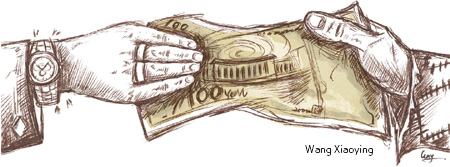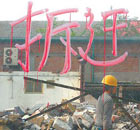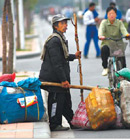Economy
Growing costs: Dilemmas, struggles facing China
By Hu Yinan, Li Jing and Wang Shanshan (China Daily)
Updated: 2010-01-22 07:49
 |
Large Medium Small |
As China celebrates GDP success, Hu Yinan, Li Jing and Wang Shanshan look at the dilemmas and struggles facing one of the world's largest economies

Li Boren digs coal for a living. He has three brothers; two work alongside him and one was killed in a mine collapse. His father was a coal miner and his teenage son will probably end up working in the mines, too.
His ambition is to send his 16-year-old daughter back to school. She was once the top student in her class but had to quit three years ago because Li could not afford the tuition fees. Now his daughter spends her days looking after the family's two-room house in Sanmenxia, Henan province, which has no heating and few comforts.
Li has never left his village but the coal he and his coworkers have mines from its depths has reached every corner of China and fueled the country's explosion in gross domestic product (GDP).
Yet the announcement yesterday that could mean China has the world's second largest economy will have little effect on Li and his family.
Some sections of society have not benefited for the financial boom as much as others, and the growing wealth gap is described by analysts as the Sword of Damocles hanging over the economic giant. Also posing a danger is a deteriorating environment that has been sacrificed for GDP growth, and a high unemployment rate among young people.
"A nation's worst fear is that its poor lose hope in bettering themselves and instead feel despair. There is such a trend in our society," said Sun Liping, a sociology professor at Tsinghua University in Beijing.
|
||||
Published by the Chinese Academy of Social Sciences last October, the report showed the income disparity between rural and urban residents is 12 times greater now than a decade ago. The annual income of an urban resident was more than three times that of a rural one in 2007, academy research found.
A separate report released last October by the National Development and Reform Commission compared the highest earners with the lowest. It showed incomes among the top 10 percent were seven times that of those lowest 10 percent in 1988. By 2007, the gap had increased to 23 times.
Experts fear that children growing up in poverty may "inherit" their parents' position in society and feel a stronger sense of injustice than previous generations.
"We need to pay special attention to two groups of people: children of migrant workers and those of urban poor families," said Li Shi, a sociology professor at Beijing Normal University. "First-generation migrant workers do not have a strong pursuit of fairness. They think it good enough to leave the countryside, and their goal is to work hard and give their children a good education. The second generation is different.
"The second generation grows up in cities and adopt the value system of urban residents, but they also feel inferior in cities. There are many of them and they tend to connect, gather and be organized. They want to change the reality. Many are still at school but will join the labor market within five or 10 years."
Children in urban poor families, whose parents are low-paid workers or unemployed, may either receive less education or have difficulties in finding jobs after graduation. They are stuck at the bottom of society and eager for change, said Li.
The wealth gap has fueled many mass incidents in recent years, according to Zheng Gongcheng, a professor at Renmin University of China in Beijing. In a survey carried out in 11 provinces, he discovered 80 percent of the more than 4,000 respondents believe society is unfair.
The disparity could also hinder economic development in the future, analysts warned.
"A lot of the wealth is in the hands of a small number of people, so there cannot be a continuous growth in domestic consumption," said Mao Peihua, associate professor of economics at Shanghai University of Finance and Economics. "In this global economic environment, China needs domestic consumption to go on with its development."








